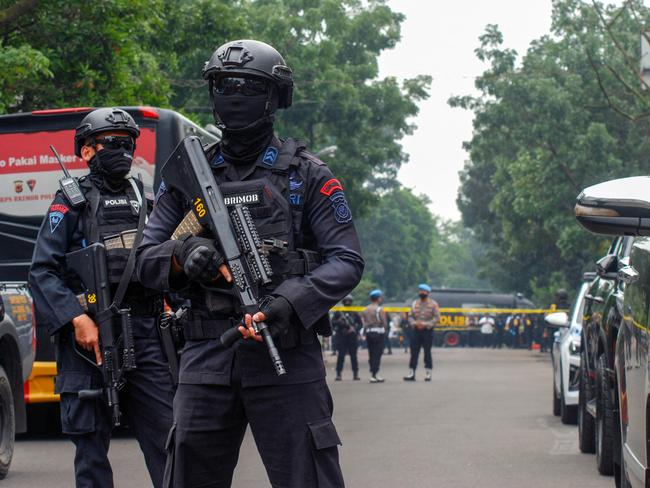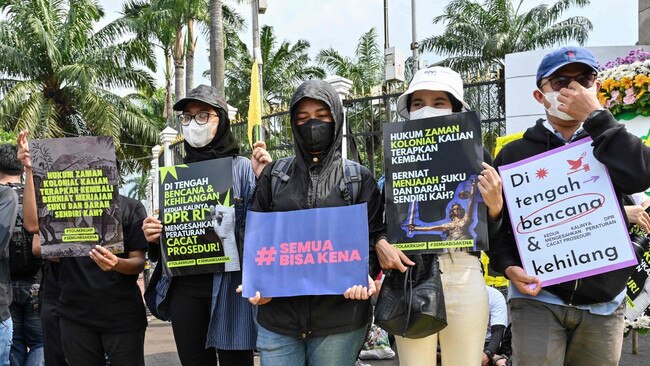Bali sex ban: New travel warning for Aussies
The Department of Foreign Affairs and Trade has updated its advice for Australians going to Indonesia after new laws banning sex outside marriage.
World
Don't miss out on the headlines from World. Followed categories will be added to My News.
The Department of Foreign Affairs and Trade has updated its travel advice for Australians travelling to Indonesia after new laws that ban sex outside marriage.
The overall advice for Australians is to exercise a high degree of caution.
DFAT has warned travellers of the new laws but noted that they do not come into force for another three years.
The advice said Australians are subejct to Indonesia’s local laws and policies and advises subscribign to the travel advice to stay up to date.
It comes after a suspected Islamist militant, angered by Indonesia’s new criminal code, killed a police officer and left at least 11 injured in a suicide bomb attack at a police station on the main island of Java.
The new law was passed in Indonesia stating that residents and tourists who have extramarital sex or cohabit before marriage will face up to one year behind bars.

Indonesian Police Chief Listyo Sigit Prabowo said it was believed the perpetrator of Wednesday’s attack in the city of Bandung was affiliated with the Islamic State-inspired group Jamaah Ansharut Daulah.
Agus Sujatno entered the police station in city of Bandung, West Java Province, on motorbike and detonated his bomb, police said.
Food vendor Herdi Hardiansyah said he was preparing meals behind the station when a loud bang shocked him.
He saw a police officer whom he recognised as one of his customers covered in blood, being carried on a motorcycle by two other officers to a hospital. He later learned the officer died, ABC News in the US reported.

The suicide bomber had previously been jailed on terrorist charges and was released in late 2021, the Mail Online reports.
“We found dozens of papers protesting the newly ratified criminal code,” Police Chief Listyo Sigit Prabowo said.
Police said a paper taped to the man’s motorbike was recovered from the Astana yar police station with the words, “Criminal code is the law of infidels, let’s fight the satanic law enforcers”.
Although there are sharia-based provisions in the new criminal code, Islamist extremists may have been angered by other articles that could be used to crack down on extremist ideologies, the ABC reports.
Indonesia’s parliament on Tuesday approved legislation that criminalises sex outside marriage and the cohabitation of unmarried couples, in a move critics said was a huge setback to rights in the world’s most populous Muslim country.
According to the text seen by AFP, sex outside of marriage will be punished with one year in prison and illegal cohabitation will have a maximum sentence of six months’ imprisonment.
WHAT NEW BALI SEX BAN MEANS FOR AUSSIE TOURISTS
The new criminal code, which also applies to foreign residents and tourists, bans cohabitation before marriage, apostasy, and provides punishments for insulting the president or expressing views counter to the national ideology.
“All have agreed to ratify the (draft changes) into law,” said politician Bambang Wuryanto, who led the parliamentary commission in charge of revising the colonial-era code. “The old code belongs to Dutch heritage … and is no longer relevant.
After the new code was endorsed by all nine parties in a sweeping overhaul of the legal code, deputy house speaker Sufmi Dasco Ahmad banged the gavel to signal the text was approved and shouted “legal”.
A provision in the text, which still needs to be signed by the president, states the new criminal code will be applicable in three years. Currently, Indonesia bans adultery but not premarital sex.

Putu Winastra, chairman of the Association of the Indonesian Tour and Travel Agencies (ASITA) in Bali, said the laws would “make foreigners think twice” about visiting Indonesia.
“From our point of view as tourism industry players, this law will be very troublesome,” Mr Putu told CNN, adding that it would be complicated to police.
“Should we ask (overseas unmarried couples) if they are married or not? Do tourist couples have to prove that they are married?”
Mr Putu said the laws could be “counter-productive” to any efforts to entice tourists back to the island, particularly while it is still reeling from the impact of the Covid pandemic.
“If these laws are really implemented later, tourists might be (subjected) to jail and this will harm tourism,” he added.
There are also fears these rules could have a major impact on the LGBTQ community in Indonesia, where same-sex marriage is illegal.
A revision of Indonesia’s criminal code, which stretches back to the Dutch colonial era, has been debated for decades.
Rights groups had protested against the amendments, denouncing a crackdown on civil liberties and political freedoms, as well as a shift towards fundamentalism in Muslim-majority Indonesia, where secularism is enshrined in the constitution.
“We have tried our best to accommodate the important issues and different opinions which were debated,” Yasonna Laoly, Minister of Law and Human Rights, told parliament.
“However, it is time for us to make a historical decision on the penal code amendment and to leave the colonial criminal code we inherited behind.”
The spokesperson of the Law and Human Rights Ministry’s criminal code bill dissemination team, Albert Aries, defended the amendments before the vote and said the law would protect marriage institutions.


He said acts of extramarital sex could only be reported by a spouse, parents or children, limiting the scope of the amendment.
The article on extramarital sex has been criticised by Indonesian business organisations as detrimental to tourism, though authorities insisted foreigners travelling to Bali would not be affected.
At a business conference before the vote on Tuesday, US ambassador to Indonesia Sung Yong Kim said he was concerned about “morality clauses” in the criminal code that can have “negative” impact on businesses.
Before the vote, a shouting match erupted between a politician from the Prosperous Justice Party, or PKS, and the deputy house speaker.
“Don’t be a dictator”, shouted Iskan Qolba Lubis, the politician from the Islamist party, after he was prevented from speaking.
Mr Wuryanto, head of the commission that oversaw deliberations on the text, acknowledged “this is a product by humans and hence it will never be perfect”.
But he invited critics to “file a judicial review to the constitutional court” instead of demonstrating.
Rights groups slammed the legislation as morality policing.
“We are going backward … repressive laws should have been abolished but the bill shows that the arguments of scholars abroad are true, that our democracy is indisputably in decline,” Amnesty International Indonesia director Usman Hamid said.
About a hundred people protested against the bill Monday and unfurled a yellow banner that read “reject the passing of the criminal code revision”, with some dropping flower petals on the banner as is done for a funeral.
Another protest to reject the new law was scheduled to be held on Tuesday in front of the parliament building.
– with AFP
Originally published as Bali sex ban: New travel warning for Aussies




